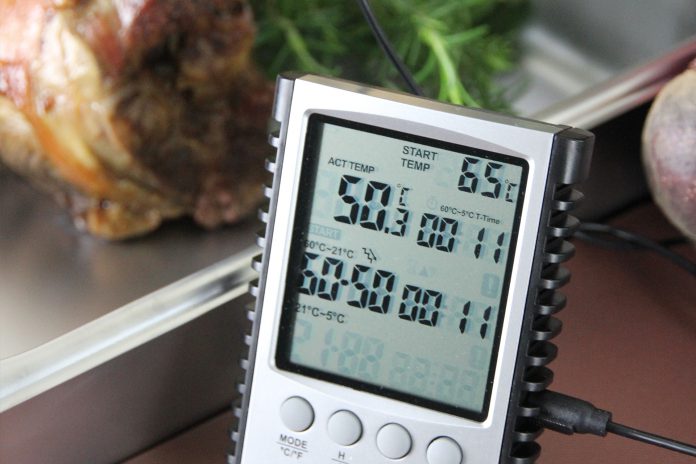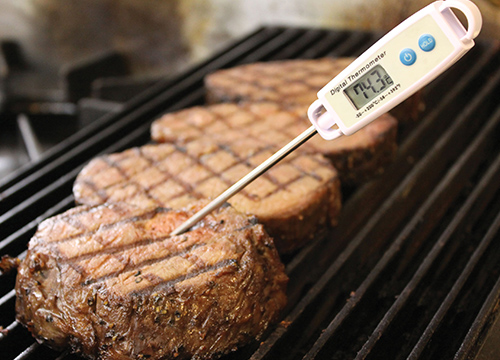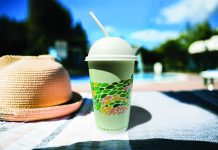
Temperature monitoring and control are amongst the most effective measures implemented to maintain food safety standards throughout the process of preparing, storing and serving food when operating a commercial kitchen. The risks associated with storing food incorrectly or serving undercooked food should not be underestimated, with foodborne illnesses posing a threat to public health and causing potentially irreparable damage to the reputation of hospitality businesses.
The correct use of a kitchen thermometer is an effective way to mitigate the risks associated with poor temperature control in commercial kitchens. The use of food and fridge/freezer thermometers can significantly improve food safety standards while reducing food waste for businesses. A handful of well-designed thermometers are now available to meet the needs of a busy kitchen. Durable, easy to use and fast, thermometers are ideal for frequent use in high-pressure kitchen environments. There are a range of thermometers available to help kitchen managers maintain a high standard of food safety.
Fridge/Freezer thermometers provide a safe storage solution
Fridge/freezer thermometers provide a continuous and accurate indication of the interior of fridges and freezers to prevent a rise in temperature that could leave food stored within the food temperature danger zone. The food temperature danger zone ranges between 5-60 °C and indicates the temperatures at which bacteria can grow and contaminate food. A fridge thermometer can be used to ensure that internal temperatures remain below 4 °C whilst a freezer should be kept between -18-30 °C to dramatically reduce the rate at which microorganisms multiply and preserve the nutritional value and quality of food. Many fridge/freezer thermometers feature an alert to signal a rise or dip in temperature to prevent food from being stored dangerously for long periods of time and reduce waste from food spoilage.
Food thermometers reduce the risk of foodborne illness
Many of the 4.1 million cases of food poisoning that occur each year could have been prevented through adherence to food safety guidelines. This includes ensuring that all food is fully cooked and served piping hot with guidelines stating that the safe internal temperature of hot food should be no less than 60°C. Food thermometers can be used to accurately determine the internal temperature of food to be sure that it is fully cooked prior to serving. This reduces the risk of food poisoning from bacteria such as salmonella which can cause vomiting, fever, chills and other unpleasant symptoms. Probe thermometers allow staff to obtain an accurate indication of the internal temperature of food in less than a second. With temperature ranges from -50-200°C, probe thermometers can be used to ensure that all foods are hot or cold enough to be served safely.

Staff working within a commercial kitchen should receive training on the use and maintenance of a digital thermometer to reduce the risk of foodborne illnesses. At a time when the safety of vulnerable members of the public is of particular concern, the correct sanitisation of all equipment and utensils is essential. Probe thermometers should be sanitized with designated probe wipes containing a high level of alcohol so as to be effective against potentially harmful microorganisms and stored correctly. To further reduce the risk of cross-contamination, infrared thermometers can be used as a contact free method of ensuring that food is at a safe serving temperature.
Fildes Food Safety is Australia’s leading supplier of food safety supplies, supplying a range of food labelling and safety resources designed to enable Chefs and Restaurant Managers to implement sustainable food safety processes across the hospitality industry.











